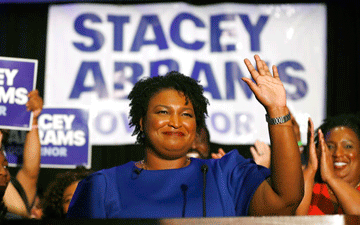
AP Photo/John Bazemore
Hana Callaghan is the director of the Government Ethics Program at the Markkula Center for Applied Ethics. Views are her own.
It’s election night. The polls have just closed. You along with family, friends, campaign staff, volunteers, and donors wait nervously in a hotel ballroom while the returns start rolling in. The television lights are bright and hot as the media captures every move, every expression. On your phone you have the direct phone number of your opposition. You know what the drill is. If you lose, you make the call conceding the race. Your opponent graciously accepts and waits for you to address your campaign before she publicly claims victory. You thank your supporters for all of their hard work. You tell them you will always continue to fight for what is right but that tonight’s fight is over. You urge unity and wish your opponent well. This is campaign etiquette 101.
But what if you don’t lose? What if the vote count is so close that there is the smallest of possibilities you might win in spite of the news outlets calling the race? Don’t forget 1948 when Truman went to bed thinking Dewey had won. And besides, don’t you have a duty to those citizens who voted for you to make sure their votes are counted? But since the possibility of you winning is really nothing more than a wish and a prayer, you wonder whether the emotional and financial burden of extending an election is too much to ask the public to bear? Whose interest are you truly serving—your ego or the public’s?
We are a society that craves instant gratification. We want to know the results of an election five minutes after the polls close. The news media want to satisfy that craving and try to tie things up during the election night special report so they can move on to the next big news story. Remember the good old days when the networks would call elections based on exit polling in other states before the polls had even closed in yours? Of course someone figured out that that was a bad idea as those of us who hadn’t gotten around to voting yet were tempted to stay home after a major race was called—down ballot races be damned.
Recently Georgia gubernatorial candidate Stacey Abrams came under fire for refusing to concede her close race against her opponent, Brian Kemp. Kemp called her refusal a “disgrace to democracy.” However, there is no law that requires conceding. In fact, the very act of conceding has no legal effect. A race isn’t officially over until certified by the pertinent government election authority. That is why someone can concede, and then “take it back” as did 2018 Florida gubernatorial candidate Andrew Gillum.
We place a heavy emphasis on the civic responsibility to vote—we even call it a sacred duty. We remind citizens of those who fought—and those who died—so that we might have the freedom to cast our ballot. On social media and on television, everyone is urging everyone else to vote. Urging people to vote—is that just partisanship? Are we really saying, “Vote for my candidate of choice, and if looks like he or she is losing, I really don’t care if you voted”? With one brief phone call, will a candidate cavalierly dismiss your civic engagement and toss your vote aside? Or do we really celebrate the act of voting itself—which is the ultimate expression of our democracy—regardless of outcome?
I come down on the side of the later. In my opinion, candidates should never concede. The votes they are discarding upon concession may be votes for them, but they are not their votes. The vote belongs to the person who casts it. Even though the votes will ultimately be counted, they should never be discounted by either candidate. Trust in our political process demands nothing less. Electing our governmental representatives is too important a process to be rushed. Let’s take our time, do it right, make sure every voice is heard and every vote accounted for.